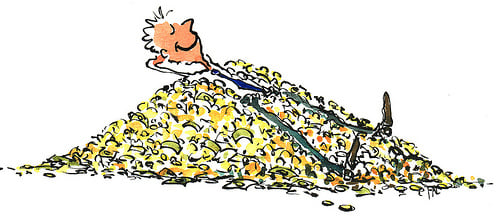This is the third of a series of articles on some of the proven methods to obtain a yearly six figure income as a real estate investor.

Image by HikingArtist.com via Flickr.com
My previous article spoke about some of the “get rich quick” ways to make a six figure salary in real estate. These models all focused on buying properties at a discount for one reason or another, putting some money into fixing them up and making them look nice, and then reselling them for whatever the top dollar of the market will allow. We focused on Fix and Flips and Tax Deeds as two vehicles that are commonly used to get rich quick in real estate.
This article will focus on two of the tried and true “get rich slow” techniques that have proven to generate a positive cash flow and/or equity buildup in your investments over a period of years. As you can expect, these methods involve different risks than those used to get rich quick and as always you should invest based on your risk comfort level.
Buy and Hold
This is a type of real estate investment that has been in effect for thousands of years. Basically it involves becoming a landlord. To do this you purchase properties that you know you can rent out for more than their carrying costs per month. How much you actually pay for the properties isn't as important as their ability to generate positive cash flow. The reason for this is because you are not going to be selling the properties in the near future, so even if you pay top dollar for them it doesn't matter.
Your goal is to get these properties paying for themselves each month, with some cash left over for you. While this is happening, your tenants are paying your mortgage for you every month as part of their rent. This means every month the amount of financing on the property is going down and your equity in the property is going up.
The nice part about these types of investments is they normally will continue to make money even when the market is in a down cycle. People always need a place to live and when markets are bad they tend to rent instead of buy when it comes to housing. As a landlord this creates a premium rate for rentals and can increase your positive cash flow.
The downside is the value of your investment may also be declining so you could be losing equity, however this is only a paper loss. If you have no plans to sell the unit and it is making money every month then you can wait out the down cycle. Eventually property values will begin to rise again and your equity will return.
Tax Certificates
These are not the same as tax deeds. When you purchase a tax certificate you are taking the place of the county with regards to the taxes owed on that piece of property. This means you are paying the taxes in full, and then getting all of the benefits of interest owed on those taxes, the same as the county would have received.
The even better part is you do not need to act as a collection agent to get repaid. The county will continue collection actions against the delinquent homeowner on your behalf. When the Tax Certificate is redeemed you are repaid all of you investment plus the interest rate you either agreed upon when you bid on the certificate or the maximum allowed by the local jurisdiction. The key is to make sure you purchase Tax Certificates on properties that you know will be redeemed such as ones secured by mortgages. The mortgage company isn't going to lose their entire investment in the property over some taxes owed so they will redeem the certificate on behalf of the homeowner to protect themselves.
All you need to do is rinse and repeat this formula.
Daniel Doran is a 20+ year veteran in the real estate industry. He is a previous owner of a law firm, mortgage and title company. Daniel has also written several books on mortgage modification, short sales and real estate investing. He currently specializes in Commercial Finance and Real Estate Development and is a graduate of Manhattanville College and Brooklyn Law School. You can contact Dan at Buildings By Owner.